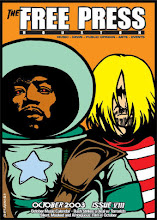Che

Back in the old days, like two-hundred years ago, when big prestige movies had engagements they literally played for a year at the same theater (that had just one screen). And these movies had a sense of the show - they featured music by which to enter the film. Che, directed and shot by Steven Soderbergh, harkens back to this mode of celluloid unwinding, a leisurely but engrossing experience.
At four hours plus change it's meant to be a cinematic moment to remember, a feat Che easily accomplishes. Please allow me an aside on the time element. I heard more than one person on mentioning Benjamin Button first saying "I hear it's three hours." Okay maybe this is not the era of watching long films but I never hear anybody lamenting, before attending mind you, an extra innings or sudden death ball game, or a super long concert with multiple encores. That's as political as I'm getting. Che doesn't get too political either, at least not in the sense that viewers are going to be converted to Marxism.
Che unwinds as the psychological mindset of a commander, with the physical reality of existing in the jungle. That one side is propelled by one type of ideology in conflict with the forces of another way of thought is just the background for the conflict itself, which unfolds at times as gripping action with spectacular set pieces. Soderbergh seems to be making an intelligent film about the revolution as opposed to the coup and it doesn't matter if you don't know who Batista or Castro or Simon Bolivar are (although it couldn't hurt).
At times Benicio Del Toro (also the producer, it's not a paycheck flick) spends as much time speechifying at the UN or operating on peasants (Ernesto Guevara was also a medical doctor) as he does firing bazookas (with great accuracy). Che runs with an intermission. The visual for each half's intro consists of Cuba and then Bolivia being graphically divided into states and cities, or in the case of Bolivia showing the outlines and then identifying the other countries in South America.
Soderbergh constantly cuts directly after an important look or explosive moment. For instance in a party scene with Senators and high society types Che attends in New York there is a moment where, while waiting for the elevator in the high rise, an associate mutters it was "quite a party." Che just gives him a death ray stare and Soderbergh instantly cuts back to the jungle. Likewise during action sequences involving a railroad train or guerilla gunfights at a farmhouse there is a rapid ending edit. Even though it's obviously a lengthy sit, Che keeps the momentum fast paced. The first part is more war action while the second half emphasizes the man in his environment. The first part has a different aspect ration (2.35:1) than the second part (1.85 : 1) and the whole thing was shot using the Red camera and lenses.
Che boosts top of the line effects, gunfights and production values and several recognizable actors appear throughout. I didn't even snap when Julia Ormond as a blonde interviews Che in a black and white sequence. This film will give you food for thought hearty enough to last the rest of the winter. Even better, once you see it you won't think like a colonized person.
The videos below show the real Che in an interview followed by Soderbergh at a Q&A from an advance screening of the film.









0 Comments:
Post a Comment
<< Home